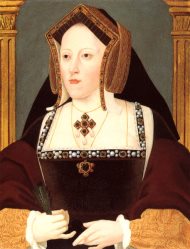Thomas Abell
Born approx 1497 d 30 July 1540
Rector and Royal Confidant
Thomas Abel belonged to the wealthy Abel
family who dealt in the clothing trade via their estates at
Colchester, Wix and Aldham.
His brother was a Prior at Earls Colne
monastery
Thomas Abel studied at Oxford University
obtaining a BA in 1514 and a MA four year later.
Like many graduates he entered the priesthood
and in 1528 became chaplain and instructor of music and language to
Catherine of Aragon and entered a court full of intrigue and
theological debate about the divorce that King Henry wanted from
Catherine.

Catherine of Aragon
As a trusted follower Catherine entrusted him
with a secret commission to Emperor Charles V concerning her divorce
from Henry VII which he skilfully completed despite efforts of
Cardinal Wolseley to stop his mission. As thanks for the completion
of this task on 23rd June 1530 she presented him with the Rectorship
at Bradwell on Sea.
Abel continued to voice his strong opposition
to the divorce in Court and as a result was banned from the court by
King Henry.
King Henry VII obtained a divorce and
published a booklet detailing his case. Thomas continued to preach
against and published a booklet entitled - "Invicta Veritas, an
answer to the determination of the most famous Universities, that by
no manner of law it may be lawful for King Henry to be divorced from
the Queen's grace, his lawful and very wife". This booklet gathered
some support in both Parliament and the country and resulted in Abel
being imprisoned in the Tower of London from 1532 to 1533 when he
was released.
Despite this of imprisonment Thomas contained
to preach against the divorce and referred to Catherine as the Queen
instead of her official tile of Princess Dowager.
Further unrest was led by the Duke of Suffolk
resulting in the arrest for treason of a group of pro Catherine
supporters including Abel.
Abel was once again was imprisoned in the
Tower of London this time for 6 years.
He was found guilty of treason as he refused
to acknowledge the Act of Supremacy and with two of the other
arrested men he died a martyrs death on 30 July 1540 when he was
hung, drawn and quartered at Tyburn .
In 1886 he was beatified by the Pope as a
martyr.
The only
traces of Abel today are his listing on the Rectors Board in the
Parish Church at Bradwell on Sea and in the Beauchamp Tower at the
Tower of London where he spent a lengthy 6 years in prison, during
which he engraved a letter A and underneath an ornate bell.



